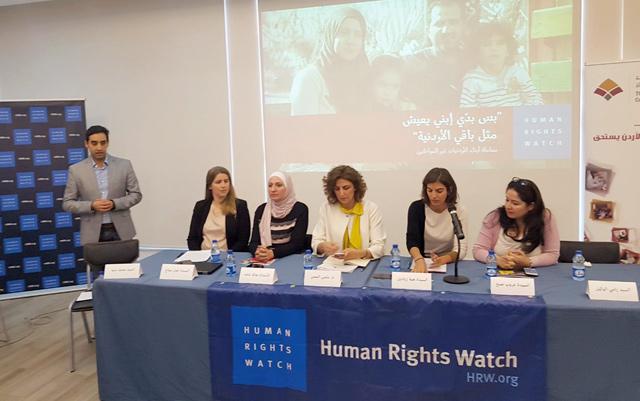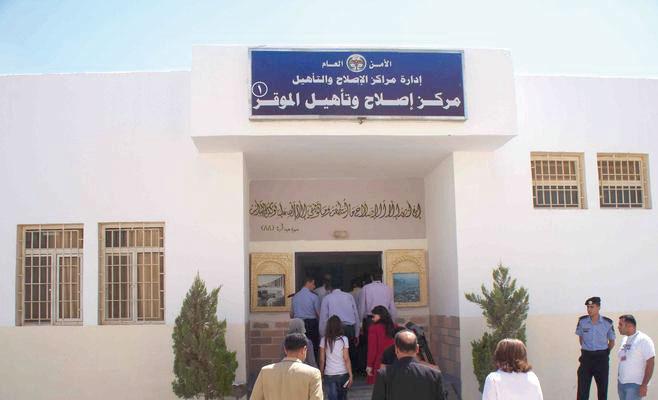You are here
Activists commend measures to ease life for children of Jordanian mothers
By Rana Husseini - Oct 10,2018 - Last updated at Oct 10,2018
AMMAN — Activists on Tuesday said a recent decision by the Cabinet to cancel a condition stipulating that Jordanian women married to non-Jordanian should live in the country for at least five years before their children could benefit from privileges is “a step in the right direction”.
On September 10, the Cabinet decided to scrap a condition stipulating a five-year continuous residency requirement for mothers, stressing that the identification cards issued to their children will be considered a valid ID by government agencies.
Rami Wakeel, one of the lead campaigners of “My mother is Jordanian and her nationality is a right for me”, said the recent government’s step is a “positive one but we still have a long way to go in terms of obtaining our full rights”, adding “several government agencies and financial institutions still do not acknowledge our IDs when we want to obtain official paperwork”.
He stressed the need for the government to “increase its surveillance at its departments to ensure that we do not suffer from rejections and hurdles when we want to apply for work, a driver licence, a loan or any other services that concerns our day-to-day life”.
“Any step the government takes is good but eventually we need better government monitoring so that the Cabinet’s decisions in our favour are respected and implemented properly,” he told The Jordan Times.
But Aroub Soboh from “My Nationality is the Right of My Family” was more critical, saying that the “ID card is not recognised by the majority of government entities and it is just considered as an ID card no more no less”.
She added that the recent step is not considered as an achievement because it benefits a limited number of people since there are a large number of people who “do not have an ID to start with”.
“Children of Jordanian women holding Palestinian documents issued from Egypt and Syria still cannot obtain identification cards and at the same time government entities are not acknowledging the ID cards that were supposedly issued to ease up our rights,” Soboh told The Jordan Times.
Soboh, a journalist and activist added: “Our position is clear, it will always be clear and it will never change. We want full citizenship for families of Jordanian women married to non-Jordanians the same way Jordanian men are treated in similar conditions, and we will never back up from our original demands.”
Meanwhile, Human Rights Watch (HRW) recently welcomed the decision of the Jordanian Cabinet to “remove a barrier to services for non-citizen children of Jordanian women”.
However, the measure does not ensure full equality in citizenship laws for Jordanian women and their children, the watchdog group said.
The change enables more children to benefit from a 2014 reform, which purported to ease restrictions on their access to basic economic rights and government services by eliminating a requirement that their mothers must live in Jordan for five continuous years. But this step will not dramatically improve the lives of non-citizen children without further reforms that ensure full equality, according to a HRW statement.
“Allowing more non-citizen children of Jordanian women access to the identification card is a small step recognising that their current situation is unacceptable,” said Sarah Leah Whitson, Middle East director at HRW, adding “but none of these half-measures are a substitute for full citizenship for children of Jordanian mothers and non-citizen fathers”.
In research released in 2017, HRW stated that the five-year residency requirement is “a major barrier” to obtaining the cards. Previously, if a Jordanian mother left the country for more than six consecutive months during a five-year period, it was considered an interruption in her residence and she would have been required to wait another five years before qualifying again, according to HRW.
Activists and families of Jordanian women married to non-Jordanians have repeatedly demanded full citizenship rights for their children and spouses.
As it stands now, Jordanian men married to non-Jordanian women can pass on their citizenship to their wives and children, a right that is denied to Jordanian women married to foreigners.
In 2014, the government pledged to ensure the proper application of the “privileges” the government had granted to children of Jordanian women, provided that their mothers had been living in Jordan for a minimum of five years, for at least 180 days per year.
Some of the “privileges” included providing residency permits, the ability to apply for driving licences and real-estate ownership, along with benefits in the educational, health, labour and investment sectors.
Individuals and entities that oppose granting citizenship to family members of these women, particularly those married to Palestinians, say such a measure will only lead Israel to implement its “ultimate plan of creating a substitute homeland for Palestinians in Jordan”.
Government figures show that there are 88,983 Jordanian women married to non-Jordanians, mostly Gazans, with 355,932 children within these families registered with the Civil Status and Passports Department.
Palestinians, except Gazans, who became refugees after the creation of Israel on Palestinian land in 1948, and those who were living in the West Bank when it was occupied by Israel in 1967, have been granted the Jordanian citizenship.
Related Articles
AMMAN — Children born to Jordanian women and non-Jordanian fathers still struggle to obtain basic rights and services in the Kingdom, Human
AMMAN — Earlier this month the National Centre for Human Rights (NCHR) presented His Majesty King Abdullah with its report on human rights a
AMMAN — The Cabinet on Monday decided to drop the requirement of uninterrupted residence for Jordanian women married to non-Jordanians for a













